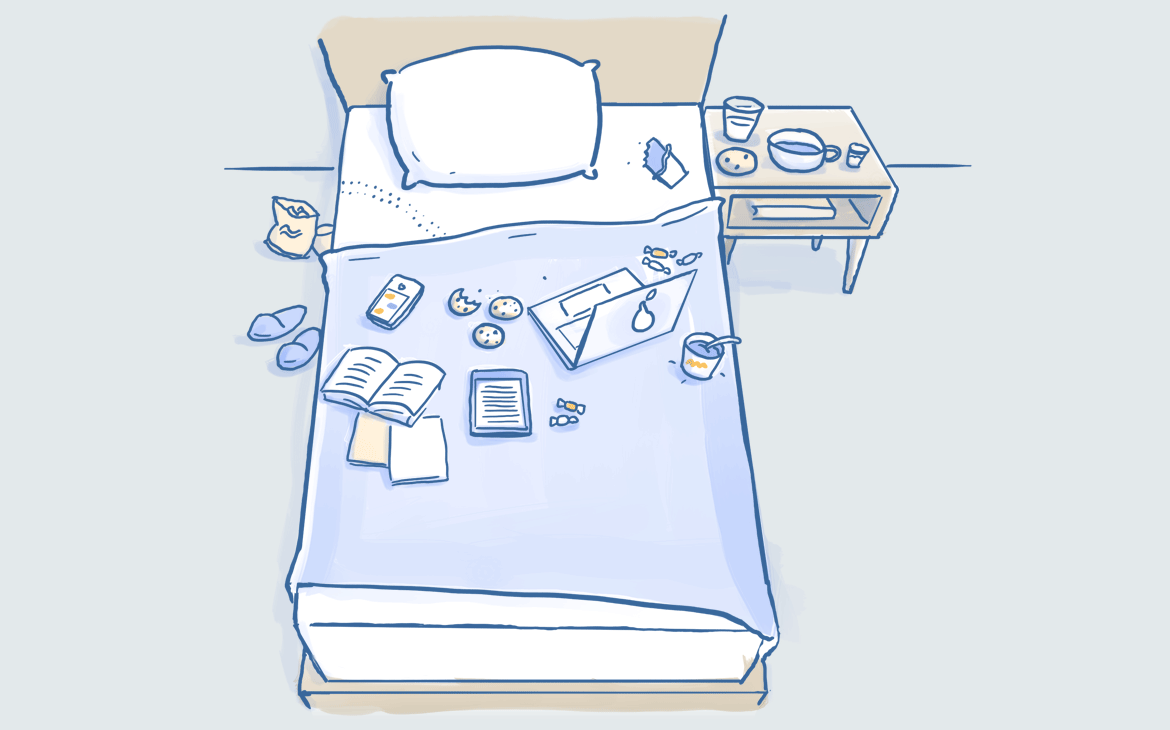Key Takeaways
- Impact of Bedtime Procrastination: Bedtime procrastination, the act of staying up late for no valid reason, can significantly impact an individual’s quality of sleep and overall well-being. Regularly engaging in bedtime procrastination can lead to sleep deprivation, resulting in physical and mental fatigue. Recognizing the negative consequences of this habit and addressing its underlying causes can foster healthier sleep patterns.
- Understanding Self-Regulation and Procrastination: Those who can effectively manage impulses, adhere to schedules, and resist temptations are more inclined to establish appropriate bedtime routines. Recognizing personal triggers and understanding the factors contributing to bedtime procrastination can aid in the development of effective strategies for curbing this habit.
- Addressing Bedtime Procrastination: This might include managing stress through relaxation techniques, forest bathing, or establishing tech-free periods before bedtime. Additionally, upgrading to a comfortable mattress can create a more inviting sleep environment and encourage better bedtime habits. Understanding the importance of quality sleep and prioritizing healthy sleep practices can lead to improved overall well-being.
Checking your email. Snacking on a sleeve of cookies. Letting your furry friend share your sleeping space. Bad bedtime habits prove a dime a dozen, but the most common one out there might be the most overlooked of all.
We’re talking about bedtime procrastination. Basically, the official scientific name for staying up too late for no good reason. As in, you should’ve gone to sleep an hour (or two, or more) ago, but you’d rather keep watching Netflix. Or scrolling through Instagram. Or rearranging your closet.
You get the idea, because you’ve definitely done it.
People have probably been procrastinating at bedtime since, well, always. But thanks to the Internet, it’s probably safe to say that we’ve reached peak bedtime procrastination age.
Bedtime procrastination likely makes more people to miss out on sleep nowadays. Which…negatively affects their wellbeing.
And experts are starting to catch on. In a 2014 article in Frontiers in Psychology, researchers wrote that bedtime procrastination likely makes more people to miss out on sleep nowadays. Which, no surprise, negatively affects their wellbeing.
Even more, they found that some people seem more likely to procrastinate at bedtime than others. Let’s look at the hallmarks of bedtime procrastination, then how to nix your nightly habit and get the sleep you need.
Are you a serial bedtime procrastinator?
To find out what makes some people more prone to bedtime procrastination, researchers rounded up 177 subjects.
After learning about the subjects’ bedtime habits and the amount of sleep they got most nights, they surveyed the subjects with questions designed to measure self-regulation—or the ability to manage impulses.
Subjects rated themselves on statements like:
- I’m good at resisting temptation.
- I plan tasks carefully.
- When I know I must finish something soon, I find it easy to get it done and over with.
The more likely subjects were to agree with these sort of statements, the better they seemed at self-regulation. And the better they handled self-regulation, the less they procrastinated at bedtime.
Which makes a lot of sense. If you’re good at ignoring the urge to check Facebook when you’re supposed to be working, or you like to make a schedule and stick with it, or you avoid procrastinating in other areas of your life, chances are you’ll be more likely to pick an appropriate bedtime—and turn in on time.
But if you find trouble resisting random impulses or avoid planning and scheduling, the opposite might prove true. You might have a harder time establishing a time to go to sleep, or struggle with closing your laptop before bed because you want to watch one more episode of your favorite show. Even though your eyelids keep fluttering shut.

Curbing bedtime procrastination.
We’re all guilty of staying up too late for no reason at some point or another. And if you only do it once in a while, it probably isn’t that big of a deal. Sure, you might feel more tired than usual the next day. But once you return to your regular schedule, you’ll likely feel fine.
But if you procrastinate on a regular basis, it very well may end up sleep-deprived before long. Which will leave you feeling crappy both physically and mentally.
Theoretically, stopping bedtime procrastination seems pretty easy. All you need to do is go to sleep. And yet, that’s often a lot easier said than done.
In that case, a little bit of soul searching might be in order. If you feel the need to stay up late just because, ask yourself why. Do you worry that you might miss out on something? Do your days seem super stressful, and late at night feels like the only chance you get to unwind? Are you unconsciously trying to sabotage your work/school/relationships by setting yourself up to be exhausted during the day?
Of course, there’s no right or wrong answer here. Different people hold different reasons for why they might avoid going to bed. What matters is being honest about the underlying cause affecting your ability to go to sleep—and taking steps to address the issue.
For instance, if you feel stressed and need more time to relax, try taking proactive steps like starting a stretching routine or even forest bathing. Constantly plagued by FOMO? Practice unplugging from your phone for short periods, then build up to going totally tech-free in the hours leading up to bed.
If you feel stressed and need more time to relax, try taking proactive steps like starting a stretching routine or even forest bathing.
Once you get to the root of your bedtime procrastination problem, you might find that going to sleep starts to feel more appealing than watching cat videos. Another easy way to make bedtime more appealing? Upgrading to the best mattress for your needs. If your bed is uncomfortable or lumpy, it can make falling asleep nearly impossible— making you less inclined to want to head to bed. However, knowing you’re about to drift off on a comfy mattress can make you look forward to bedtime.
And after a while, who knows? You might even find yourself nodding off early.
About the author
Marygrace Taylor is an award-winning health writer for Amerisleep. Her commitment to sleep health is evident in her ability to consistently prioritize eight hours of sleep each night. Her in-depth interviews with industry experts, such as Ken Ceder on "Why Light is Essential for Great Sleep and Optimum Health," highlight her dedication to delivering valuable insights. Marygrace's work has been featured in reputable publications like Business Insider, Glamour, Refinery29, Metro UK, and Hunker, further solidifying her expertise in the field.
View all posts




